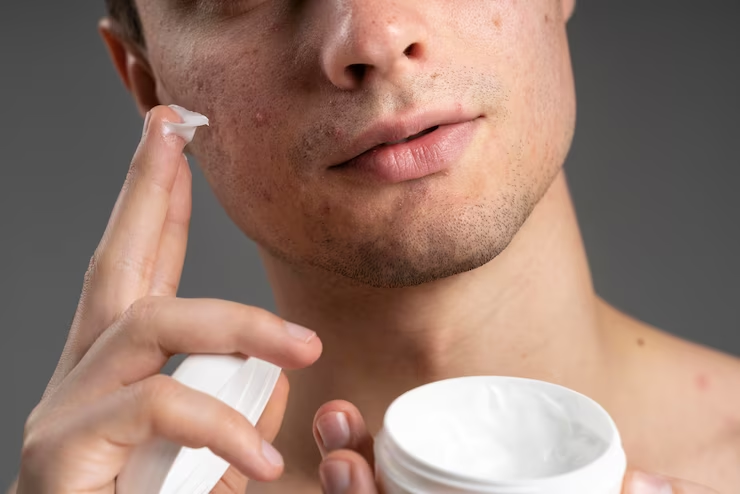
Pimples are a common problem for many people, but they can be especially difficult for those who experience them on their faces. If you're one of these people, you know how frustrating it can be to feel like your skin is constantly breaking out.
But don't worry! There are lots of ways to prevent and treat pimples naturally. And if you follow these tips, your skin will thank you with clearer and smoother skin ready for anything.
In this blog post, we'll talk about the prevalence of pimples and how to incorporate a proper pimple self-care routine. We'll also cover what treatment options work best for different pimples, so you can keep your skin healthy and pimple-free.
What are Pimples?
Pimples are common skin conditions that affect people of all ages. Pimples are caused by an overproduction of sebum, an oily substance produced by glands under the surface of your skin. When these glands become clogged with dirt and dead skin cells, they release too much sebum into your pores. The extra oil causes your pores to swell up and form a bump called a pimple.
Common Causes of Pimples

Improper Diet
A diet that is high in fats and carbohydrates can lead to the production of excess oil, which clogs your pores. Dairy products also cause an increase in sebum production and may lead to outbreaks of acne.
Hormonal Changes
During puberty, the body produces more androgenic hormones, which increases sebum production by oil glands. This causes pimples to form on the face and back area. Menstruation is also considered a major cause of pimples in women, because of the release of various hormones
Stress
Anxiety is known to cause an increase in cortisol production, which leads to increased oil gland activity and leads to acne breakouts on the face and shoulders. It can also aggravate existing pimples by causing redness around them or making them more tender than usual.
Lack of sleep
Another major cause of pimples is not getting enough sleep. When you're tired, your body produces more cortisol, which makes your skin oilier and more likely to cause breakouts. Make sure you get at least 7 hours of sleep every night, and try to take a nap during the day as well!
Harsh products
Skincare products are another big factor in causing breakouts. Many available products contain chemicals that irritate the skin and cause irritation and inflammation. Ensure that all of the products you use on your skin are non-comedogenic (meaning they don't clog pores).
Touching your face often
Keeping your hands off your skin will reduce bacteria buildup and irritation, which will help keep breakouts at bay. If you need to touch your face, cleanse it with soap and water after each use so that no bacteria can build up.
Types of Pimples
Blackheads
Blackheads are the result of clogged pores. They appear when dirt and oil get trapped in your pores and oxidize, causing them to turn black. Blackheads can be removed using an extractor (preferably by an experienced person) or applying a mask containing salicylic acid.
Whiteheads
Whiteheads are similar to blackheads, but the pore is not completely blocked, so they appear white instead of black. To treat whiteheads, apply a salicylic acid mask or use a glycolic acid cleanser.
Papules
Papular acne refers to small red bumps on your skin that often appear in groups or clusters. They typically occur on your face and back and in other areas with friction, such as underarms or knees.
To treat papular acne, apply aloe vera gel twice daily until they disappear completely (usually within two weeks). You can also apply calamine lotion, which helps dry up any open sores associated with papules so they go away faster! (Show reference please)
Pustules
Pustules acne are red, inflamed bumps that are filled with pus. The pus is created when the oil in the hair follicle gets trapped under the skin and begins to fester. Pustules can occur on their own or in clusters, and they usually look like little whiteheads.
The most common way to treat pustules acne is over-the-counter topical medications like benzoyl peroxide or salicylic acid. These medications can be applied directly to the skin to reduce inflammation and fight off bacteria that cause acne, but they should be applied after consulting a dermatologist as they can also irritate the skin in certain individuals
Cysts
Cysts tend to be larger than other pimples, and they have a solid core that feels like a lump or bump under your skin. They're filled with pus, dead skin cells, or oil, so they often take longer to go away than other types of pimples—and sometimes even leave scars behind.
If you have any of these types of acne, it is important to implement a good acne self-care so that they can heal properly and prevent future breakouts.
To treat them, you must visit your dermatologist to have them drained or surgically removed. Your doctor will likely prescribe an antibiotic cream or ointment to treat the infection causing your cyst.
Best Self-Care Practices for Pimples

There are many ways to incorporate a pimple self-care routine if you have acne. There are many different opinions out there, but we've found that some practices seem to work for just about everyone. Here are our top five tips for taking care of your skin when you have acne:
Wash Your Face Twice a Day
Washing your face twice a day is one of the best ways to prevent breakouts and keep your skin looking healthy. This can be as simple as using a gentle cleanser and water, but if you're prone to acne, try using an oil-based cleanser instead.
Use a Gentle Cleanser
When choosing a cleanser, look for one that is gentle on the skin and won't leave any residue—this can lead to new breakouts! Look for products designed specifically for acne-prone skin so they don't irritate or dry your skin further.
Avoid Touching Your Face
Touching your face can spread bacteria from place to place on your body, which can cause breakouts. If you absolutely must touch your face, wash your hands first! You don't want bacteria getting into those pores and causing problems later on.
Don't Pop Your Pimples
While popping pimples may seem like an easy fix, it can cause more harm than good in the long run. By popping them too early or too often (or even just once), you can end up with scars that take much longer to heal than they would if left alone.
Avoid Harsh Scrubs and Exfoliants
Exfoliants are meant to help clear away dead skin cells that are clogging your pores. But if you have acne-prone skin, the wrong exfoliation can cause more breakouts. Choose a gentle scrub that's made specifically for your skin type. If you have oily or combination skin, look for scrubs with salicylic or glycolic acid ingredients. If you have dry or sensitive skin, try a moisturizing scrub instead.
Apply Topical Treatments
There are several topical treatments available for the treatment of acne. Some of the most common include benzoyl peroxide (BP), salicylic acid (SA), sulfur, resorcinol, azelaic acid, tretinoin (RetinA), adapalene (Differin), erythromycin ointment and clindamycin lotion or gel.
These treatments are applied directly to the skin, where they help to reduce inflammation, unblock pores, and kill bacteria. You must only use products your doctor approves, as some can cause irritation or other side effects if used incorrectly or in high doses.
Eat a Healthy Diet
A healthy diet is key to maintaining good skin. Your diet should consist of foods high in antioxidants, like fruits and vegetables, which will help protect your skin from the sun and other environmental factors that can cause damage.
Stay Hydrated
Drinking water helps keep your body hydrated while also flushing out toxins that may be causing problems with your complexion or other health issues, such as acne breakouts or cystic acne (which occurs deep inside the pore).
Home Remedies for Pimples
The best acne self-care is to treat skincare as a priority. Your skin is your first line of defense against bacteria, so it's important to treat it well. Several home remedies for pimples can help eliminate acne and prevent future breakouts.
Home remedies for pimples include:
Tea Tree Oil
Tea tree oil is a powerful antifungal and antibacterial agent. It also helps to dry out whiteheads and blackheads. To treat a pimple, apply a small amount of tea tree oil to the affected area using your fingers or a cotton swab. Do not use too much – just one or two drops should be enough.
Aloe Vera
Aloe vera has long been used in traditional medicine as an antibacterial, antifungal, and anti-inflammatory agent. It can help treat acne by soothing irritated skin, reducing inflammation, and preventing infection from developing in pimples.
Apply aloe vera gel to your face using your fingers or a cotton swab once daily until the pimple disappears completely (usually within 24 hours). You may also want to apply aloe vera gel directly after washing your face each morning for the best results!
Honey
Honey has antibacterial properties, which help in killing bacteria and thus help you to clear off your pimples fast. Mixing honey with lemon juice will help you get even better results, as lemon juice helps remove dead skin cells from your face.
Turmeric
Turmeric is a spice from the root of a plant called Curcuma longa and has been used in traditional medicine for thousands of years. Turmeric contains antioxidant and anti-inflammatory properties that can help treat acne and improve skin health, including pimples.
Turmeric can be consumed as tea or added to your favorite food. The recommended dosage is 500–2,000 mg of powdered turmeric daily to see results.
Green Tea
Green tea contains antioxidants called catechins, which help protect your body against free radicals that cause damage to cells and DNA. Free radicals are produced when you're exposed to UV rays from the sun, pollution, cigarette smoke, or even stress.
Green tea is also full of polyphenols, which have been shown to kill acne-causing bacteria and reduce inflammation by regulating sebum production (oil).
When to Seek Medical Attention for Pimples
If you've ever had a pimple, you know how frustrating it can be. They can be annoying, painful, and embarrassing. When should you seek medical attention for your pimples?
First, if your pimples are persistent or severe, it's a good idea to talk to a dermatologist. If your acne worsens or does not respond to treatment, it could be a sign of another medical condition like adult-onset acne or rosacea.
Second, if you're concerned about scarring or hyperpigmentation from acne, it's important to see a dermatologist as soon as possible. Acne usually heals itself within two weeks (which can be a long time when you're struggling with breakouts). But if the inflammation from your breakouts doesn't subside in that period, there's a chance that scarring may occur.
Finally, if you have any symptoms of infection, like pus or redness around the area of your pimple(s), it's also important to see a doctor right away—especially if the pimple(s) are tender and painful when touched.
To wrap it up…
The best pimple self-care is to be gentle with your skin.
Don't pick at it, don't scrub it, or don't do anything else to irritate it. Trying to get rid of acne as soon as possible is tempting, but when treating your skin like this, you're making things worse. If you want healthy skin, you have to give your body time to heal—and that means not touching it!
If you're looking for more information about how to care for your skin, we recommend heading to our website and checking out our blog. We have lots of great articles on acne and other skin care topics!







